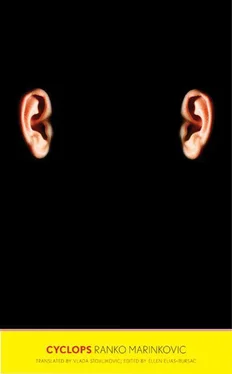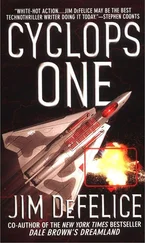Unrealistic and childish, like Dom Kuzma’s Samson story in Melkior’s boyhood. Nevertheless Melkior found serious, military pathos in those images. He pictured himself as a muscular, strapping soldier decked out in full army gear (isn’t that what they call it) standing at attention in a column of awesome Samsons about to slay the Philistines with the jawbone of an ass. … All they were waiting for is the order from the officer on the white charger …
Reflected in the plate glass window, among the shoes on display, was Melkior’s thin, unprepossessing silhouette, a poorly built city dweller. The slanting image reflected in the shop window triggered a crafty sneer inside Melkior, and the word mobilization suddenly found itself in autumn mud churned by a squelching olive drab monotony of dejected strangers on some endless trek; there was the bluster of angry sergeants, the tired voice of sodden boots, and the mysterious word “aide-de-camp.” Here was born a fear of the new events around him: the driver bound for Apatin to drive a tank … across our mountainous country. … Oh for a mountain and a forest in which to go quiet and still like an insect curled deep inside the bark of an indestructible tree: I’m not here … and to live, to live. … How to conceal one’s existence, steal from the world one’s traitorous body, take it off to some endless isolation, conceal it in a cocoon of fear, insinuate oneself into temporary death?
Dom Kuzma had no idea that he might be the object of envy. … Arriving at a weighing machine tended by an invalid in a passageway, he doffed his hat, ran his handkerchief over his small moth-eaten head with ears — as if two angels were carrying it, ran his handkerchief over his thin sweaty neck and the inside of his hat, donned the hat, put the handkerchief in his pocket and stepped up onto the platform.
The invalid was waiting only for him (it was getting very dark): he stirred obligingly and made a hurried stomp with his wooden leg, put on his thread-reinforced glasses and weighed Dom Kuzma with what might have been due reverence. By all appearances, Dom Kuzma was a good regular customer who had long since earned the man’s full confidence. The question of confidence was key here.
The patient whose life depends on testimony from a common weighing machine is likely to have little confidence in a commercial device (which was after all invented for the purpose of deceiving), and even less in its master. He is suspicious and thinks everyone is out to con him, to do him out of several precious decagrams, of the last thing supporting his life — his very life, my friend!
Dom Kuzma waited anxiously for the fateful amount which meant to be or not to be. He actually fiddled with the arms of the scale and had some words with the invalid, brushing the latter’s hand away impatiently, but calmed down eventually and made his peace with the scale, collected his ticket and went away, worried.
It seemed to Melkior that he was witnessing a crafty rite designed to test the grace of God, if not His actual existence. With intellectual embarrassment, as if he were extending his palm to be read by a palm-reading neighbor, he stepped onto the platform with an anxious heart. Apatin is a town on the Danube, he thought, or the brand name of an anti-apathy drug. …
“How much?” he asked the invalid, faking a casual tone.
“Sixty-one kilos, seven hundred and eighty grams.”
“It can’t be!” he cried in alarm.
“Oh yes it can,” replied the invalid with self-confidence. He was used to the bickering of skinny clients.
“What? Why, I’m …”
“You’re skinny enough to weigh that much,” said the invalid with a doctor-like cynicism. “My machine does not steal,” he added for the sake of his reputation. “Don’t worry, we earn our bread fair and square.”
“I’m not worrying about it stealing,” he used a smile to explain his meaning. “What I’d like to know is, does it give a little?”
“Neither. The true weight whatever the freight.”
“And that … that priest fellow … how did he fare?”
“Same as this morning.”
“You mean he was here this morning as well to …?”
“Oh yes. Twice a day he shows up.” The invalid had visibly had enough of the pointless conversation; he was finding Melkior’s curiosity a bit suspicious: “This fellow’s too nosey by half …”
“Could it be a case, then, of mortification of the flesh?” insisted Melkior. “He may be trying to become a saint for all you know.”
“I don’t know what saints you have in mind, but he’s a subscriber, if you must know. Pays in advance by the month, he does. Third year running.”
“Third year? And he weighed more then — three years ago, I mean — than he does now, didn’t he?”
“Not up to anything funny, are you?” the invalid shot a glance at the newspaper in Melkior’s hand. “He tipped them at eighty-plus to begin with. He was so strong his eyes flashed. Now he barely makes fifty-six. And that’s with my help.”
“Your help?” Melkior felt fear at the technical term. So the scrawny neck did not come of the cellar and penance at Monte Cassino? To the invalid he said hypocritically, “Well, there you are, it’s like I said: he’s bound for sainthood.”
“Ahh,” the invalid waved his hand compassionately, “he’s bound for Mother Earth, that’s where he’s bound. He’s got this wasting disease, poor man, and every single gram he’s lost has been registered by me — and my old gal,” and he gave the machine’s iron neck a chummy slap. “The twenty-six kilos he’s lost so far, that’s nothing. He never noticed how I slashed them, I did it all little by little. He knows I took them away, of course he does, but he’s not said a word to me about it. But when it’s a question of ten grams … you’re killing me, he mutters, you’re killing me indeed.”
Melkior thought back: perhaps it was all due to the loss of those seven locks while he was sleeping?
“And now I have to drop him by over eight hundred grams a month. The man’s dying on my machine, as it were, before my eyes, and I have to keep a record of it day in and day out. I’m having a hard time of it, but what can I do?” The invalid was not lying, he genuinely felt for Dom Kuzma. “I give him anything up to sixty grams of an evening, to set him up nicely for bed, but come morning I bring him down by a hundred and twenty. He hangs his head, there are tears in his eyes, he doesn’t believe me; you’re lying, he says, how could I have possibly lost so much overnight? Your machine’s out of whack, he says, get it fixed! I’m a human being, don’t forget! and he cries with fear. He goes to the blind colleague over there on the corner, who consoles him — by mutual agreement, shall we say — with a couple of grams. But then he won’t believe him either, and comes back to me again, the pest.
“Your machine’s good, he says, all things considered. On second thought, he says, you can lose weight overnight, through the digestive process and so on. … All the same you should keep an eye on it, you should indeed! As for that man on the corner, his contraption’s no good at all. If you ask me, he says, his license should be revoked. Chose a corner position, no less! You think he’s really blind? That’s their cover, no doubt about it. … And I have no choice but to say yes. Now then, he says, let’s have another go in the name of God. So I weigh him again, pressing a wee bit, to reassure him. I’ve driven this here nail into my peg leg for him special, and I press the bottom bar, careful like, as if I am squeezing drops into his eye. But he smells a rat, thinks the measure’s now too good all of a sudden, and he won’t believe me. Go on, he says, press your scale! There will be somebody to press the scale for you, too, when your soul is weighed before God! And off he goes, all angry and unhappy. He was unhappy just now, too, over weighing the same as he did this morning. He’d had the feed of his lifetime, he said … he even showed me his belly. There he is now, over at the other fellow’s, he may yet be back here again. I feel sorry for him, you might say. The man’s wasting away like a leaf in autumn, and all I can do is look on. Not to mention that he still owes me over two kilos.”
Читать дальше












